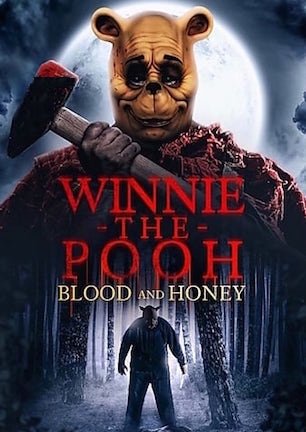Studio: ITN Distribution
Director: Rhys Frake-Waterfield
Writer: Rhys Frake-Waterfield
Producer: Rhys Frake-Waterfield, Scott Jeffrey
Stars: Nikolai Leon, Maria Taylor, Craig David Dowsett, Chris Cordell, Natasha Rose Mills, Amber Doig-Thorne, Danielle Ronald
Review Score:
Summary:
Having turned feral after being abandoned by Christopher Robin, Winnie-the-Pooh and Piglet embark on a bloody killing spree.
Review:
It goes without saying that no one should ever take pleasure in an unsuspecting person being undeservedly duped. Despite saying that anyway, for longtime horror fans who now know better after being repeatedly hoodwinked by shameless producers peddling poor knockoffs or piggybacking off of popular properties, it’s still a little funny to see mainstream media sources and everyday moviegoers get scammed into thinking “Winnie-the-Pooh: Blood and Honey” might be something inventively special, only to discover it’s just another bad B-movie to toss into the DTV dumpster.
By now, more people are aware that author A.A. Milne’s initial Hundred Acre Wood creations fell into the public domain in 2022. Disney’s imagery can’t be copied since The House of Mouse still owns their specific visions of those characters. But like Dracula, Sherlock Holmes, or any other work whose original copyright has expired, anyone and their brother can do pretty much whatever they want with Winnie-the-Pooh and his pals.
Before this became more common knowledge, some people heard the enticing hook of “Winnie-the-Pooh horror movie” and got the wrong impression. These were regular people who know nothing of indie horror’s microbudget world, where first-time filmmakers round up friends for a weekend in a white-walled home to shoot cheap digital footage they call a “film.” So when notable news outlets widely reported on the wild idea of Winnie-the-Pooh and company becoming bloodthirsty maniacs, they probably pictured an “official” production that would be professional quality given the notoriety of its namesake.
To be crystal clear, I don’t mean to insult those people at all. Honestly, lucky them for not having to live with the knowledge of what happened to the once-theatrical Amityville “franchise.” Once again though, I can’t help but snicker a bit when I picture eager grins turning into confused scowls when they saw “Winnie-the-Pooh: Blood and Honey’s” bargain basement production value and wondered, “Wait, what the hell is this?” Folks, I feel for you. Those of us who regularly wade in such waters have dealt with opportunists ruining the reputation of indie horror for decades.
Also to be crystal clear, I don’t begrudge writer/director Rhys Frake-Waterfield at all for “Winnie-the-Pooh: Blood and Honey’s” shenanigans. On the contrary, I admire, even envy him for latching onto a remarkable scheme before anyone else did, letting word of that concept snowball into free marketing, then getting audiences to take the bait through a misleading theatrical push the movie didn’t deserve. Getting noticed in the low-budget business is 95% of the battle, and getting noticed is exactly what “Winnie-the-Pooh: Blood and Honey” did. Now the film has to deal with the fallout from everyone who was fooled, feels frustrated, or wants to take up pitchforks and torches to treat it like Frankenstein’s Monster.
Easily the best thing, perhaps the only good thing, in “Winnie-the-Pooh: Blood and Honey” is its two-minute prologue. In it, pencil sketch animation summarizes an amusing backstory of how and why Pooh and friends went from friendly to feral. It also conveniently explains why Eeyore isn’t among the group anymore as well as why they no longer talk, even though the likelier explanations are that a live-action Eeyore would be too challenging to create and the cheap latex masks worn by the Pooh and Piglet actors don’t allow their mouths to move.
You read that right. “Winnie-the-Pooh: Blood and Honey” only features Pooh and Piglet, and only as two men wearing Halloween masks that are, hilariously or insultingly – I’m not sure which, supposed to pass for actual animal faces. As the shockingly dull movie dragged on, I half-expected to find out Pooh and Piglet really were mere men in masks all along, and Christopher Robin was actually driven insane by a secret society of serial killers who convinced him as a kid that they were magical creatures. Instead, the film simply sends these two burly dudes to terrorize a group of women at a cabin in the woods, basically taking a bright idea for turning a beloved children’s icon into a fearsome freak, then only using it for the exact same scenario that 90% of all other slashers already have.
The main woman who meets Pooh’s knife and Piglet’s sledgehammer has one laughable background bit about being traumatized by a stalker, which is only marginally more descriptive development than “Buxom Blonde Obsessed with Taking Selfies” gets. The other three indistinguishable warm bodies are Brunette, Other Brunette, and Brunette with Glasses. Christopher Robin plays a criminally minimal role, presumably so “Winnie-the-Pooh: Blood and Honey” can instead spend a majority of its minutes drawing out snoozy scenes of tiptoeing, hiding, and letting in every rando who wants to come in from left field to be killed with little context.
That’s legitimately all there is to this 80-minute lump of a lark that could have been fun if it didn’t come up with a kooky premise and immediately cut off all creativity right there. That premise is the lone novelty. Everything else is derivative drivel that looks shabby to boot. I’d say nice try for the concept alone, except “Winnie-the-Pooh: Blood and Honey” never truly tries at all. I’d also send sympathy to those who innocently expected something better than what they got. Now that they’re wiser from having been burned, I’ll instead welcome them to the bottomless sewer of lo-fi indie fright flicks. Don’t feel bad. Winnie-the-Pooh apparently dwells down here now too.
Review Score: 20






“We Bury the Dead” doesn’t have enough meat on its bones to land on a list of top ten zombie films for any of its three release years.